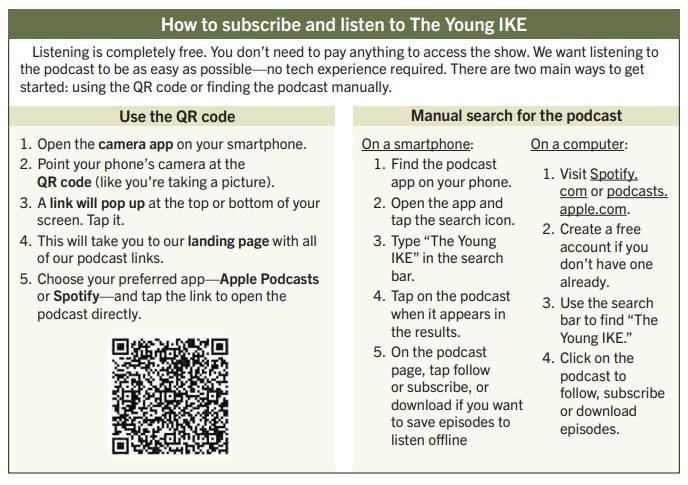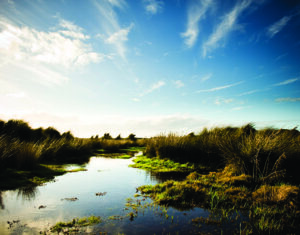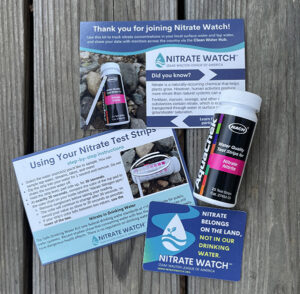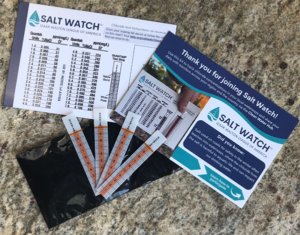“The Young IKE” Podcast Turns Listeners into Participants

Griffith Pugh, founder of The Young Ike, is a student at Haverford College, a founding member of the Green Crew at the League’s Minnesota Valley Chapter and member of the League’s Minnesota Division Board of Directors.
Think back to March of 2020. When the COVID pandemic first hit, nearly every aspect of daily life— including Izaak Walton League activities—was put on hold.
Like many League chapters across America, our work at the Minnesota Valley Chapter in Bloomington, Minnesota, has always centered around bringing people together in the context of nature. Sometimes this is hands-on citizen science projects; other times, it means hosting educational events—guest speakers, informational meetings and town halls focused around conservation—drawing members of the local community into the fold to learn and engage together.
Thankfully, it quickly became clear that being in nature was one of the safest activities during the pandemic, and soon many of our outdoor-focused programming resumed. However, the educational and dialogue-driven events sadly, never fully bounced back.
Last spring, four years removed from COVID, our chapter began brainstorming ways to revive these community events that had once been so central to our mission. First, we talked with other chapters across the state. We quickly realized this wasn’t an isolated issue— others were struggling with the same problem and were searching for solutions
So we asked the question: Could we not just rebuild our educational events—but instead, create a new model for community engagement built for the 21st century?
Lost IRL (in real life): community and conversations
Many of the most pressing environmental issues of our day simply aren’t receiving the time and attention they deserve. Culture wars distract us from examining facts, embracing nuance and forging solutions.
When conversations about our natural resources do happen, they’re often confined within the polarized corners of social media—driven by algorithms designed to generate outrage and clicks rather than meaningful dialogue. Social media makes it appear as though everyone is deeply divided about everything—including the environment (meat lovers vs. vegans, EV advocates vs. gas car enthusiasts, or even avid anglers vs. catch-and-release purists).
This intense division isn’t fully reflective of reality; it’s an illusion amplified by the platforms we use. In fact, recent polling from Gallup shows that close to two-thirds of Americans are worried about climate change. Social science research tells us time and time again that when we meet IRL, face to face, common ground is easier to find.
However, a significant issue is that “third places”—community spaces where people can come together—are rapidly disappearing. The solution we need is twofold: First, we need quality educational programming that is honest, curiosity-driven and embraces the complexity of environmental issues. Second, we must create these third spaces where people can engage in real dialogue, in person and rediscover common ground.
Podcasting: a tool for chapter and community revival
Once we clearly identified the problem and decided on the need for a new approach for promoting conservation education and community dialogue, we turned to one of today’s fastest-growing media formats: podcasting. And with that, “The Young IKE” was born—with a mission to revive and deepen dialogue surrounding environmental conservation. (Hold on, we’ll get to the “in real life” part in a few paragraphs.)
Each quarter, The Young IKE focuses on a single environmental topic. At the start of the quarter, I conduct a series of interviews featuring guests who are experts on the topic—a recent example is the issue of green technology, mining and threats to natural areas like the Boundary Waters Canoe Area Wilderness. We intentionally select guests with different backgrounds and perspectives because we believe solutions to complex problems come from engaging folks on all sides of an issue. Then we release these interviews onto podcast platforms.
People listen to the podcasts and then, at the end of the quarter, come together in person (chapter members and community members alike) at our Izaak Walton League chapter house for an evening of in-person dialogue, moving the conversations beyond the podcast. Think of it as a pod-club (a book club for a podcast). Our pilot, pod-club, in early 2025 was extraordinary: people from across the community came together, inspired by the podcast and a shared search for genuine human connection.
Attendees scribbled ideas on reflection sheets, exchanged personal stories and shared their thoughts on topics and potential solutions. Conversations started around mining and the Boundary Waters but evolved into new friendships and deeper community bonds by the evening’s end. For the first quarter of 2025, we tackled a critical question: How do we reconcile the tension between conserving our natural lands while scaling green technology? Everything we produce begins either on a farm or in a mine. How can we balance protecting treasured natural areas while also developing essential technology for a cleaner future?
I spoke with four incredible experts: conservation and Boundary Waters advocate Becky Rom, expert academic on e-waste and green energy Roopali Phadke, CEO of the Initiative for Responsible Mining Aimee Boulanger and Reuters journalist and National Book Award–nominated author Ernest Schyder.
Coming in the second quarter of 2025, we’ll explore our evolving relationship with water through the lens of agriculture. How do we grow food without sacrificing the health of our rivers and lakes? From cutting-edge farm practices to local watershed efforts, next season dives into the choices communities face to protect both land and water. Whether you’re in Minnesota, Iowa or anywhere our rivers run—this story flows through all of us.
You are the hero: join the movement
The Young IKE is a nod to our fellow League members and supporters. “Young” highlights the importance of engaging the next generation of League leaders, but more broadly, it symbolizes the culture we are cultivating through our work—a commitment to adapt and grow. In this sense, young means innovative, open-minded and dynamic.
The Young IKE podcast sparks curiosity, leans into uncomfortable tensions around important environmental issues and ultimately brings meaningful conversations off the earbuds and into the real world.
We can’t achieve this ambitious vision without you. You now have a powerful new tool to strengthen your chapters, revive important conversations, and energize your membership.
Stay connected, bring it home
Stay connected, bring it home Follow us on social media @theyoungike on Instagram, Facebook and LinkedIn to stay up to date on new episodes and events. Consider hosting a live discussion at your chapter.
Please reach out to learn more about joining this movement by contacting me via email at griffith@theyoungike.org. We’d love to connect and support you every step of the way toward launching a pod club at your chapter. We’re still in the early stages and excited to share our vision and bring you along for the journey.
Here is your opportunity to reclaim, rebuild and rejuvenate both chapter programming and engagement in your region. Energize your members and inspire meaningful action—all sparked by a simple podcast and your commitment to its vision.
Your community is waiting. If not now, then when? If not you, then who?

 Your kit will include a bottle containing 25 nitrate test strips which you can use to test your water source(s) throughout the year. You’ll also receive postcards explaining how to use your nitrate test strips and how to share your Nitrate Watch results on the Clean Water Hub.
Your kit will include a bottle containing 25 nitrate test strips which you can use to test your water source(s) throughout the year. You’ll also receive postcards explaining how to use your nitrate test strips and how to share your Nitrate Watch results on the Clean Water Hub. Your kit will include four test strips so you can test your waterway throughout the season. You’ll also receive a chart to help you interpret your results and a postcard with instructions for completing a Salt Watch test and reporting your findings.
Your kit will include four test strips so you can test your waterway throughout the season. You’ll also receive a chart to help you interpret your results and a postcard with instructions for completing a Salt Watch test and reporting your findings.